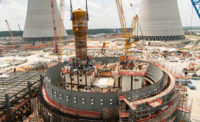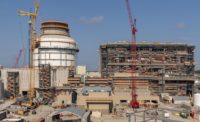When Bechtel was selected in 2017 to complete the construction of Georgia Power’s Vogtle nuclear Units 3 and 4, the company turned to the leader of its nuclear group, Ty Troutman, to see the big task to completion. A 35-year veteran of Bechtel and the nuclear business, he was president of the contractor's nuclear power business and a company vice president. Now Vogtle project director, Troutman has overall responsibility for quality, safety, budget and schedule performance. As Bechtel nears peak completion at Vogtle, Troutman addressed how the company is going to hire the workers necessary as well as meet productivity goals. In June, state construction monitors expressed skepticism that Bechtel could meet the accelerated project schedule that calls for completion of Units 3 and 4 by April 2021 and April 2022, respectively.
When is peak construction expected?
Peak construction will start in the third quarter of 2018 and last through 2019 as we complete the bulk of our electrical and mechanical commodity installations. In late 2019 and throughout 2020, the site will switch gears toward mostly testing and startup activities.
How many workers are onsite and how many more workers do you need to complete the job?
At the project’s peak, we’ll have more than 7,000 union craft workers and 1,500 Bechtel non-manuals, such as field engineers, supervision, etc.
What kind of workers are needed to complete the job?
On the non-manual side, we have assembled a team of nuclear professionals that works in field engineering, craft supervision, project controls, safety, procurement, etc.
On the craft side, since we are beginning the bulk of our electrical and mechanical installations, we need a substantial number of electricians, electrician welders, pipefitters and pipefitter welders to get us through our peak construction period in 2019. At our peak, we currently project a need of 1,500 electricians and 1,400 pipefitters.
Where are you finding the workers? Are you looking out of state for craft and other workers, or are you working with the local unions?
Locally, nationally and internationally. For craft, we have hosted multiple job fairs, pulling in talent from Georgia, South Carolina and Florida, and we provide on-site training programs to upgrade existing skill sets, including welding. The local and international unions have been very supportive, and they’ve been instrumental in interviewing and screening individuals recruited through the job fairs and referring them to the project.
The sheer number of skilled craft workers necessary to complete the project has lead us to expanding our recruiting efforts to other regions of the country, Puerto Rico and other areas of North America where there are labor surpluses.
What is the project doing to attract workers?
The project, local and international unions and our craft subcontractor—Richmond County Constructors, LLC [a joint venture between Bechtel and Williams Plant Services.] —have built an employment package for craft that is competitive with other construction projects nationwide. It includes per diem, bonus, and growth opportunities—not to mention the experience of working on the first nuclear power plants being constructed in the United States in over 30 years. When it goes online, those workers who have gained nuclear experience will be in demand.
Are you able to use the workers who lost their jobs when construction stopped at the VC Summer [nuclear plant in South Carolina]?
Yes. We recruited both non-manual and skilled craft workers from VC Summer.
How are you increasing productivity at the same time as you are onboarding the new hires to meet the accelerated schedule?
In my experience, you stabilize productivity before you ramp up the project, and that’s what we’re focusing on now. This includes leaning-out work processes, improving how we supply resources required for a task to the workforce, and training and building a leadership team that understands and shares our values and goals. Then, as we bring on new hires, we blend them into existing crews to bring them up to speed as quickly as possible and instill in them the safety and quality culture required to be successful on a nuclear project.
What is your biggest challenge to getting qualified workers?
The biggest challenge is attracting workers in an ever-tightening construction labor market. A combination of incentives, work schedule and upskilling/training opportunities are what we have to offer. I believe that what we have put together—plus the opportunity to be a part of such an iconic project—is enough to attract resources from across the country and the Americas.
Do you need subcontractors?
For activities that Southern Nuclear, Bechtel, and RCC aren’t self-performing, we are using specialty contractors. At this phase, as we hit peak construction and head towards startup, contracts typically include coatings, fire protection, penetration seals, insulation, heat tracing, HVAC, and some tanks.
How do subcontractors find out about opportunities?
Contact Southern Nuclear supply chain.
Is there anything else potential laborers, craft workers or subcontractors need to know about finding work or working with Bechtel at Vogtle?
A project like this brings together people from different places and different experiences, so it is imperative to have a common denominator that brings us together as a team. And that common denominator for us, is safety, quality, building leaders, and rewarding those who deliver as strong team members. We are looking for team members that share those values.




